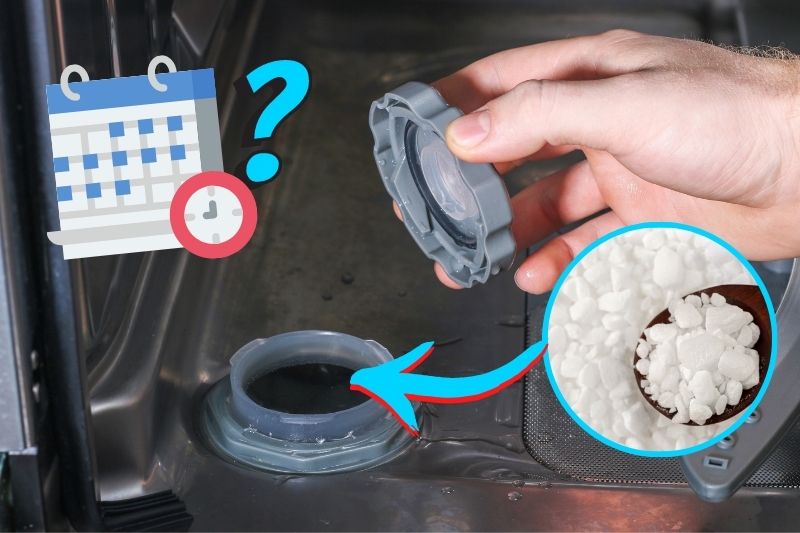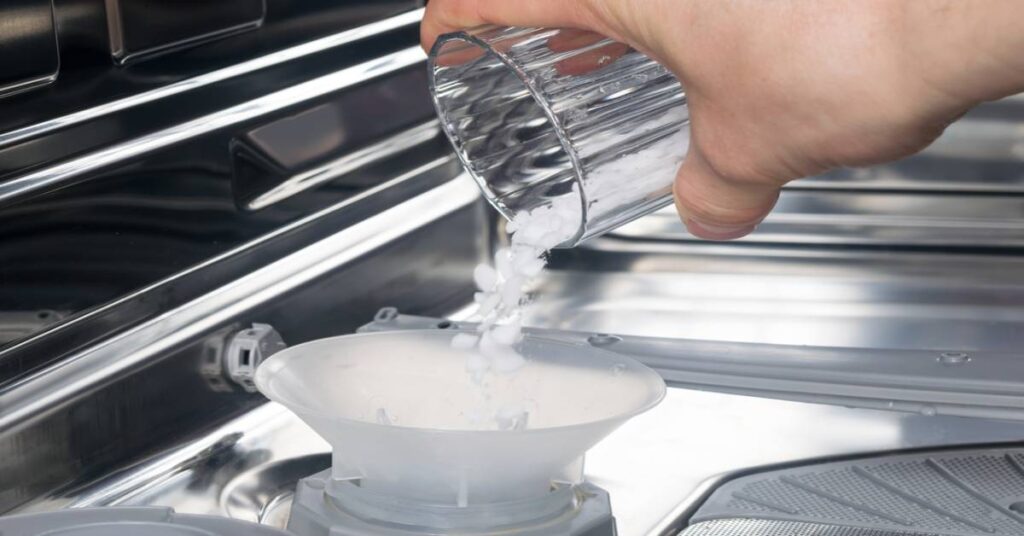The amount of salt in a dishwasher varies depending on the type and model. Generally, it is recommended to use between 1-2 tablespoons of salt for each cycle. This should be added directly into the detergent tray before starting a washing cycle.
It is important to note that too much salt can damage your machine, so it’s best to follow the instructions provided by your manufacturer regarding how much salt to use when running a dishwashing cycle.
When using a dishwasher, it is important to understand how much salt should be used in the appliance. Depending on the type of water you have, the amount of salt needed can vary greatly. Generally speaking, hard water requires more salt than soft water and using too little or too much can cause damage to your dishes and dishwasher.
To ensure optimal performance and cleanliness of your dishes, always refer to your dishwasher’s user manual for specific instructions on how much salt should be added – this will help you avoid any issues with build-up or clogging due to improper use of detergent or salt.
How to REFILL Dishwasher SALT & RINSE AID
How Much Salt to Put in Dishwasher First Time
Using too much salt in your dishwasher the first time can cause damage to both the machine and your dishes. It is recommended that you use no more than 2 tablespoons of salt for a standard-sized dishwasher with hard water. If you have soft water, then only 1 tablespoon should be used.
Additionally, when using any type of detergent, it’s important to follow the manufacturer’s instructions carefully and use only their suggested amount of detergent – not more or less!
How Much Salt in Dishwasher Bosch
The amount of salt necessary for a Bosch dishwasher depends on the model and type of water used. Generally, the recommended dosage is 4-6 tablespoons of specialized dishwasher salt per refill; however, some models may require up to 8 tablespoons. If you live in an area with hard water, it is important to use more salt as this helps keep your dishes clean and free from lime scale build up.
Dishwasher Salt Reservoir Full of Water
Having a dishwasher salt reservoir full of water is not ideal as it can cause problems with the machine. This can happen if there is too much water in the system or if the salt cap has become loose, allowing water to enter. To fix this issue, make sure that you check and see if your salt housing lid is securely closed before running a cycle.
You should also empty any excess water out of the reservoir and fill it back up with fresh dishwasher salt. Doing so will help ensure that your dishwasher performs optimally and safely.
How Much Salt in Dishwasher Beko
The amount of salt that should be used in a Beko dishwasher depends on the model you have. Generally, it is recommended to use between 1 and 2 tablespoons of salt per wash cycle for most models, although some may require more or less than this. To ensure optimal performance from your dishwasher, only use Beko’s specially formulated universal dishwasher salt as other varieties can cause damage to the internal components.

Credit: inthewash.co.uk
Can You Put Too Much Salt in a Dishwasher?
No, you cannot put too much salt in a dishwasher. Dishwashers use different types of detergents and salts to clean dishes and cutlery. While some models may have an option for “super salty” settings, these are typically not needed or recommended.
Too much salt can cause damage to the dishwasher by clogging the drain and filter system, as well as corroding interior components over time. It can also affect the taste of your food if there is residual salt remaining on your dishes after a cycle has finished running. The most common type of salt used in dishwashers is sodium chloride (table salt).
Generally speaking, it should be added only when necessary—usually once every 4-6 months for hard water areas—and never more than 2 tablespoons per cycle.
How Much Salt Should I Put in Dishwasher?
The answer to this question depends on the type of dishwasher you have, as well as the type of detergent that you are using. Generally speaking, most dishwashers require 1 teaspoon (roughly 5 grams) of salt for each load. However, if your dishwasher is equipped with a softener setting or you’re using a liquid detergent, then no extra salt should be added.
If in doubt about how much salt to add to your dishwasher, it’s best to check the instructions in your owner’s manual or consult an expert who can give you more detailed advice on what will work best with your machine and detergent. And remember: too much salt can damage some parts of the machine – so make sure not to overdo it!
Should Salt Compartment in Dishwasher Be Full of Water?
It is important to make sure that the salt compartment in your dishwasher is full of water. Salt helps to soften hard water, making it easier for detergent and other cleaning agents to work more efficiently. A lack of salt can cause calcium deposits which can damage your dishes and even restrict the flow of water through pipes.
When you fill up the salt container, ensure that you are using a special type designed specifically for use in dishwashers or else it could negatively affect how well your machine works. Make sure you have the right amount; too much will also be counter-productive as it will take longer for the salts to dissolve and won’t be effective until then. It’s not necessary to refill this every time you use your dishwasher but do check regularly and top up when needed!
What Happens If You Don’T Put Salt in Dishwasher?
If you don’t put salt in your dishwasher, it can have a significant impact on the efficiency of your machine and the quality of your dishes. Without salt, limescale and other minerals that might be present in tap water will build up inside the dishwasher over time. This can cause clogging and blockages that can lead to reduced performance or even complete failure of the appliance.
Additionally, without salt to soften hard water, detergents may not dissolve properly leaving residue behind on dishes as well as potentially damaging parts within the machine itself such as pumps and seals. Over time this could result in increased energy costs due to having to run longer cycles or more frequently from lack of cleaning power. To avoid these issues always remember to use approved dishwasher salts with every cycle for optimal results!
Conclusion
This blog post has provided information about the recommended amount of salt for dishwashers and clarified that too much salt can be potentially damaging to your machine. It is important to remember that different machines require different amounts of salt, so it is wise to consult your user guide or manufacturer’s instructions before adding any. With this knowledge in mind, you should now have a better understanding of how much salt your dishwasher requires and how to maintain it properly in order to get the best results out of your appliance.
More Explore
How to Remove an Integrated Dishwasher?
How to Drain Bosch Dishwasher?
Do Dishwashers Need Hot Water?
What is an Integrated Dishwasher And How to Install It?
How Much Water Does a Dishwasher Use Uk?

